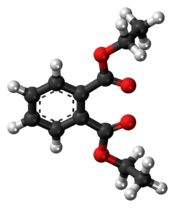邻苯二甲酸二乙酯
化合物
邻苯二甲酸二乙酯(英語:Diethyl phthalate,缩写DEP)是一种邻苯二甲酸和乙醇形成的酯,室温下为无色澄清液体,密度略大于水,燃烧时会产生有毒气体[3]。
| 邻苯二甲酸二乙酯[1] | |
|---|---|

| |

| |
| IUPAC名 Diethyl benzene-1,2-dicarboxylate 1,2-苯二甲酸二乙酯 | |
| 别名 | Diethyl phthalate |
| 识别 | |
| CAS号 | 84-66-2 |
| PubChem | 6781 |
| ChemSpider | 13837303 |
| SMILES |
|
| InChI |
|
| InChIKey | FLKPEMZONWLCSK-UHFFFAOYAV |
| ChEBI | 34698 |
| KEGG | D03804 |
| 性质 | |
| 化学式 | C12H14O4 |
| 摩尔质量 | 222.24 g/mol g·mol⁻¹ |
| 外观 | colourless, oily liquid |
| 密度 | 1.12 g/cm3 at 20 °C |
| 熔点 | -4 °C(269 K) |
| 沸点 | 295 °C(568 K) |
| 溶解性(水) | 1080 mg/L at 25 °C |
| log P | 2.42 |
| 蒸氣壓 | 0.002 mmHg (25°C)[2] |
| 磁化率 | -127.5·10−6 cm3/mol |
| 危险性 | |
| NFPA 704 | |
| 爆炸極限 | 0.7%-?[2] |
| PEL | none[2] |
| 致死量或浓度: | |
LD50(中位剂量)
|
8600 mg/kg (Rat) |
| 若非注明,所有数据均出自标准状态(25 ℃,100 kPa)下。 | |
由于邻苯二甲酸二乙酯可溶于大部分有机溶剂,因此常用于化妆品和香水[4] ,其他工业用途包括增塑剂、洗涤剂和喷雾剂[5]。由于皮肤经常暴露于邻苯二甲酸二乙酯,它的毒性问题非常重要。几个研究表明邻苯二甲酸二乙酯会造成神经系统损伤和男性与女性的生殖系统问题[6][7][8]。
参考文献
编辑- ^ Chemical Information Profile for Diethyl Phthalate (PDF). Integrated Laboratory Systems, Inc. [3 March 2009]. (原始内容 (PDF)存档于1 February 2009).
- ^ 2.0 2.1 2.2 NIOSH Pocket Guide to Chemical Hazards. #0213. NIOSH.
- ^ ICSC:NENG0258 (International Chemical Safety Card for 1,2-Benzenedicarboxylic acid diethyl ester). [2020-02-01]. (原始内容存档于2017-10-25).
- ^ Api, A.M. Toxicological profile of diethyl phthalate: a vehicle for fragrance and cosmetic ingredients. Food and Chemical Toxicology. 2001, 39 (2): 97–108. doi:10.1016/S0278-6915(00)00124-1.
- ^ Ghorpade, N.; Mehta, V.; Khare, M. Toxicity Study of Diethyl Phthalate on Freshwater Fish Cirrhina mrigala. Ecotoxicology and Environmental Safety. 2002, 53 (2): 255–258. doi:10.1006/eesa.2002.2212.
- ^ Miodovnik, A. Endocrine disruptors and childhood social impairment. Neurotoxicology. March 2011, 32 (2): 261–267. PMC 3057338 . PMID 21182865. doi:10.1016/j.neuro.2010.12.009.
- ^ Ivelisse Colón et al. Identification of Phthalate Esters in the Serum of Young Puerto Rican Girls with Premature Breast Development. Environmental Health Perspectives. 2000, 108 (9): 895–900. PMC 2556932 . PMID 11017896. doi:10.1289/ehp.00108895.
- ^ Shanna H. Swan. Environmental phthalate exposure in relation to reproductive outcomes and other health endpoints in humans. Environmental Research. 2008, 108 (2): 177–184. Bibcode:2008ER....108..177S. PMC 2775531 . PMID 18949837. doi:10.1016/j.envres.2008.08.007.
